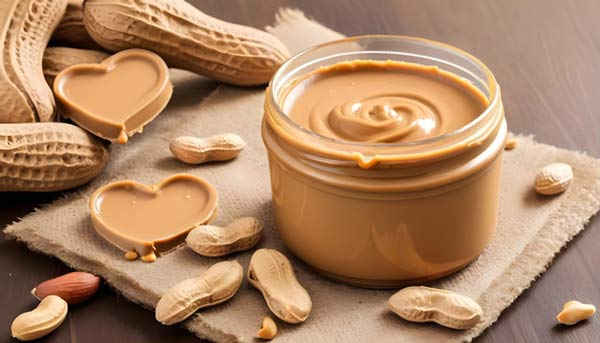If you enjoy indulging in peanut butter but are battling heartburn afterward, you might be surprised by the culprit. While peanut butter is a beloved spread for many, its high-fat content can sometimes trigger heartburn symptoms.
Understanding how certain foods like peanut butter can affect your digestive system is key to managing discomfort and making informed dietary choices.
Understanding Heartburn
Causes
Heartburn is often caused by acid reflux, where stomach acid flows back into the esophagus. Certain high-fat foods can trigger these symptoms, exacerbating acid reflux and GERD. Peanut butter, being high in fat content, can contribute to heartburn issues.
Symptoms
Common symptoms of acid reflux and GERD include heartburn and regurgitation. The discomfort experienced can range from mild to severe, impacting daily activities significantly. Complications such as esophagitis or Barrett’s esophagus may arise if left untreated.
Prevention Tips
To manage GERD symptoms effectively, it is crucial to watch your diet. Limiting or avoiding trigger foods like those high in fat can help alleviate symptoms. Including monounsaturated fats in the diet, such as peanut butter, can provide a healthier alternative while still satisfying cravings.
Peanut Butter Basics
Nutritional Profile
Peanut butter is rich in nutrients and contains high levels of healthy fats essential for the body. It primarily consists of monounsaturated and polyunsaturated fats, which are beneficial for heart health. These fats can help reduce the risk of heartburn by promoting proper digestion and minimizing acid reflux symptoms. Health organizations recommend moderate fat intake to manage GERD effectively.
Types
Smooth
Individuals prone to heartburn often opt for smooth peanut butter due to its creamy texture that is easier on the digestive system. The smooth consistency aids in smoother digestion, reducing the likelihood of triggering reflux symptoms. When selecting peanut butter for GERD management, choosing a smooth variety can be advantageous in maintaining digestive comfort.
Crunchy
Despite its rough texture, crunchy peanut butter remains popular among consumers for its added crunch and nutty flavor profile. However, this type may pose challenges for individuals with GERD due to its potential to aggravate acid reflux symptoms compared to smooth varieties. The chunky nature of crunchy peanut butter can lead to slower digestion, potentially causing discomfort for those susceptible to heartburn.
Natural
Natural peanut butter options offer additional benefits for individuals managing GERD. They are free from additives commonly found in commercial brands that may trigger acid reflux episodes. Natural peanut butter provides a healthier alternative that promotes better digestive health by avoiding unnecessary oils and sugars in some commercial products. Opting for natural varieties ensures a cleaner ingredient list without compromising taste or nutritional value.
Peanut Butter and Heartburn
Connection Explained
Consuming high-fat foods like peanut butter can exacerbate symptoms of GERD. Fat content in foods affects how quickly the stomach empties, potentially leading to acid reflux. Fat can lower the pressure of the lower esophageal sphincter (LES), allowing stomach acid to flow back up into the esophagus. However, monounsaturated fats found in peanuts may help manage these symptoms by being easier to digest.
Trigger Factors
Understanding scientific insights is crucial for managing symptoms effectively. Certain ingredients can aggravate GERD, such as acidic or spicy foods. Opting for low-fat versions of peanut butter or other snacks can reduce discomfort. Portion control is key; consuming smaller amounts of high-fat foods like peanut butter may lessen heartburn episodes.
Scientific Insights
Scientific research suggests that reducing fat intake can alleviate heartburn symptoms. It’s essential to be mindful of ingredients that could trigger GERD, such as artificial additives or preservatives commonly found in processed snacks. Opting for natural and minimally processed peanut butter varieties might be beneficial for individuals prone to heartburn.
Ingredients to Avoid
Avoiding ingredients like trans fats and excessive sugar in peanut butter products is advisable for individuals with GERD. These components can contribute to inflammation and worsen digestive issues. Opt for natural peanut butter options without added sugars or hydrogenated oils for a healthier choice.
Recommended Types
For those with sensitive stomachs prone to heartburn, it is recommended to choose natural or organic peanut butter that contains minimal additives. Look for products with just peanuts and salt listed in the ingredients; this ensures a cleaner option without unnecessary additives that could trigger acid reflux.
Portion Control
Practicing portion control when enjoying peanut butter can help prevent heartburn flare-ups. Limiting intake to a tablespoon per serving reduces the likelihood of overeating high-fat content at once, which could lead to increased gastric distress.
Choosing Peanut Butter for Acid Reflux
Ingredients to Avoid
Steer clear of peanut butter with added sugars and hydrogenated oils. These ingredients can trigger heartburn symptoms.
Opt for natural peanut butter without any added sugars or oils. Look for options with just two ingredients: peanuts and salt.
Avoid peanut butter brands that contain high fructose corn syrup, as this can exacerbate acid reflux symptoms.
Recommended Types
Consider opting for organic peanut butter, which is free from pesticides and harmful chemicals that could aggravate heartburn.
Look for creamy varieties of natural peanut butter instead of chunky versions, as they are easier on the digestive system.
Key Takeaways:
- Choose natural peanut butter with minimal ingredients.
- Opt for organic options to avoid pesticides.
- Creamy textures are preferable over chunky varieties.
Summary and Recommendations
Key Takeaways
Peanut butter does not directly cause heartburn, but certain factors may contribute to its development. One key factor is its high-fat content, which can relax the lower esophageal sphincter, leading to acid reflux. Consuming peanut butter in moderation can help reduce the risk of heartburn.
- High-fat foods like peanut butter can trigger heartburn symptoms.
- Pairing peanut butter with whole-grain bread or crackers can help minimize its impact on heartburn.
- Avoid eating large amounts of peanut butter, especially before bedtime, to prevent discomfort.
Best Practices
When consuming peanut butter:
- Opt for natural or organic varieties without added sugars or oils.
- Choose creamy over chunky varieties if you are prone to heartburn.
- Consider spreading a thin layer of peanut butter on toast instead of eating it in a spoonful.
Frequently Asked Questions
Does peanut butter cause heartburn?
Due to its high-fat content, peanut butter can trigger heartburn in some individuals. However, each person may react differently, so monitoring your triggers and symptoms is essential.
Can I still enjoy peanut butter if I have acid reflux?
Choosing low-fat or natural peanut butter options might be better for individuals with acid reflux since they are less likely to trigger symptoms than regular high-fat varieties.
What dietary tips can help manage GERD symptoms related to peanut butter consumption?
To minimize the risk of heartburn from peanut butter, consider consuming it in moderation, pairing it with whole-grain items like bread or crackers, and avoiding eating it close to bedtime.
Are there any surprising side effects of consuming peanut butter for individuals prone to heartburn?
Aside from triggering heartburn, some people may experience bloating or gas after consuming peanut butter. It’s crucial to pay attention to how your body reacts and adjust your intake accordingly.
How can lifestyle adjustments complement dietary changes for managing heartburn caused by foods like peanut butter?
Incorporating habits such as eating smaller meals, avoiding lying down immediately after eating, and maintaining a healthy weight can support efforts in reducing the likelihood of experiencing heartburn episodes.



